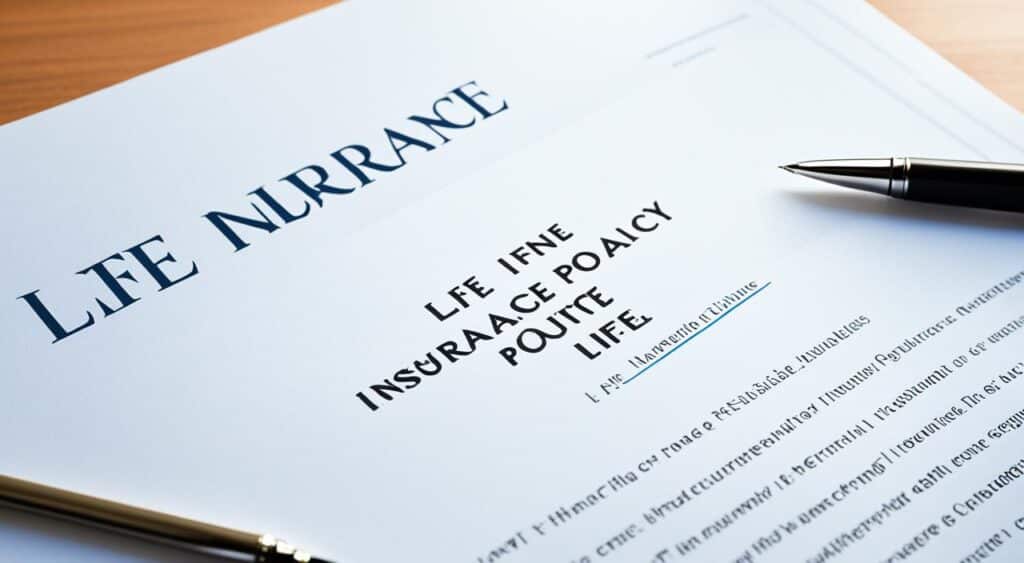Life insurance is key for financial safety and peace of mind. It’s a contract between you and an insurance company. They promise to pay a set amount, called the death benefit, to your loved ones when you pass away. You pay premiums over time to keep the coverage active.
There are two main types of life insurance: term and permanent. Term insurance covers you for a set number of years, like 10 to 30. It only pays out during that time. Permanent insurance, like whole or universal life, covers you for life or until you give it up.
Key Takeaways
- Life insurance is a legal contract between an insurance company and a policyholder.
- The insurer agrees to pay a death benefit to named beneficiaries upon the insured person’s passing.
- Policyholders pay premiums to maintain coverage, which can be either term-based or permanent.
- Term life insurance provides coverage for a specific period, while permanent life insurance lasts for the policyholder’s lifetime.
- The death benefit can be used to cover end-of-life expenses, debts, and provide financial security for the policyholder’s loved ones.
Understanding Life Insurance Policies
Life insurance is key to protecting your loved ones if you pass away too soon. There are many types of policies, each with its own benefits. Knowing about these can help you pick the right coverage for your needs and goals.
Types of Life Insurance Policies
Common life insurance types include term, whole, and universal life insurance. Each offers different coverage and cash value options.
- Term life insurance covers you for a set time, like 10, 20, or 30 years. It’s often the cheapest choice but doesn’t grow in value.
- Whole life insurance covers you for life if you keep paying premiums. It also builds cash value that you can use or borrow against.
- Universal life insurance is flexible and lets you change your premiums and death benefits as needed. Indexed universal life and variable universal life offer investment options for the cash value.
- Burial or final expense insurance is for a smaller death benefit to cover funeral costs.
Knowing the main features and differences between these policies helps you choose the best one for your needs and life insurance premiums.
How Life Insurance Works

Life insurance is a contract between the policyholder and the insurance company. The policyholder pays premiums, either all at once or over time. In return, the insurance company promises to pay a death benefit to the named beneficiaries when the insured person dies.
The death benefit is a lump-sum payment. It helps cover costs like funerals, debts, and daily expenses. If the policyholder keeps paying premiums, the policy stays active. The death benefit goes to the beneficiaries when the insured person dies.
The process of life insurance can be simplified into several steps:
- The policyholder applies for a life insurance policy, sharing details about their age, health, and coverage needs.
- The insurance company looks at the risk and sets the premium amount.
- The policyholder pays premiums regularly, monthly, quarterly, or yearly, to keep the policy.
- When the policyholder dies, the named beneficiaries claim the policy.
- The insurance company checks the claim and pays the death benefit to the beneficiaries if approved.
Life insurance gives financial security and peace of mind to loved ones. It ensures their needs are met after the policyholder passes away.
“Life insurance is not just about protecting your family’s financial future; it’s about giving them the resources to thrive, even in your absence.”
Understanding life insurance helps people make smart choices for their coverage needs and their loved ones.
Reasons to Get Life Insurance
Life insurance is a key tool for protecting individuals and their families from financial hardship. It ensures your loved ones are taken care of if you’re not there. This can cover college expenses for kids or help a supporting partner financially.
Many people buy life insurance to leave an inheritance for their loved ones. This planning helps ensure your family can keep their lifestyle and pay for important things like final expense or funeral costs. For older folks, burial insurance is especially useful, so their family isn’t hit with these costs.
Common Reasons for Life Insurance
- Protect loved ones from financial hardship in the event of policyholder’s death
- Cover college expenses for children
- Provide steady income for a supporting partner
- Leave an inheritance for beneficiaries
- Ensure final expense and funeral costs are covered
- Obtain a burial insurance policy for end-of-life planning
Life insurance helps families keep their standard of living and pay for important bills after the policyholder passes away. By thinking about these reasons, people can make smart choices to protect their loved ones and secure their financial future.
Life Insurance Policy

A life insurance policy is a contract between the policyholder and the insurance company. It spells out the rules and conditions. The company agrees to pay a death benefit to the named beneficiaries when the insured person dies. The policy owner pays premiums, either all at once or over time. This is in exchange for the company’s promise to pay the death benefit.
The death benefit is a big payment the beneficiaries can use for things like funeral costs, debts, and everyday living expenses. If the policyholder keeps paying premiums, the policy stays active. The death benefit will then be given to the beneficiaries when the insured person dies.
| Key Features of a Life Insurance Policy | Description |
|---|---|
| Policy Owner | The individual who owns the life insurance policy and is responsible for paying the premiums. |
| Insured | The person whose life is covered by the insurance policy. |
| Beneficiaries | The individuals or entities designated to receive the death benefit upon the insured’s death. |
| Death Benefit | The lump-sum payment made to the beneficiaries when the insured person passes away. |
| Premiums | The periodic payments made by the policyholder to the insurance company to maintain the policy. |
The life insurance contract between the insurance company and the policy owner details the policy’s terms and conditions. This includes the death benefit amount, the premiums to be paid, and the rights and duties of both sides. This contract offers financial protection for the policyholder’s loved ones if the insured person dies.
Factors Affecting Life Insurance Premiums

Many things can change how much you pay for life insurance. The main ones are your age and gender. These affect how long you’re likely to live, which is key for the insurance company.
Your health and any health issues you have also matter a lot. So do your lifestyle choices, like dangerous hobbies or jobs. These things help decide how much you’ll pay.
Insurance companies check your health with a medical exam. This helps them figure out your risk level. People in better health usually pay less for insurance.
If you get healthier over time, you might pay less for insurance. You can ask for a lower rate if your health improves.
| Factor | Impact on Premiums |
|---|---|
| Age | Older individuals typically pay higher premiums due to increased life expectancy risk. |
| Gender | On average, women have longer life expectancies, resulting in lower premiums compared to men. |
| Health Conditions | Pre-existing medical conditions or poor overall health can significantly increase premium costs. |
| Lifestyle | Risky hobbies or occupations can lead to higher premiums to account for the increased risk. |
Knowing these factors helps you make better choices. You can get a better deal on life insurance that suits your needs.
How to Get Life Insurance

Getting life insurance is easy if you’re ready. Start by collecting your personal and health info. This includes your age, gender, health history, family health, and any risky activities or jobs. This info helps decide how much coverage you need and the cost.
Then, you might have to take a medical exam. This exam checks your health with a physical, blood tests, and more. You’ll also need to show your ID, like a Social Security card or driver’s license.
After applying, look at policy quotes from different insurance providers. This helps you find the best life insurance that fits your budget and needs. Remember, health issues or other risk factors might change what you can get.
| Step | Description |
|---|---|
| 1. Gather Personal Information | Collect your personal information, family history, and lifestyle details for the life insurance application. |
| 2. Undergo Medical Exam | Get ready for a medical exam during the underwriting process to check your health. |
| 3. Compare Policy Quotes | Look at and compare policy quotes from various insurance providers to pick the best life insurance for your budget and needs. |
By taking these steps, you can confidently go through the life insurance application process. You’ll find the coverage that protects you and your loved ones.
Life Insurance Coverage

Life insurance policies protect your loved ones after you pass away. They offer a death benefit to cover costs like funerals and debts. This includes mortgage payments, tuition fees, personal debts, and daily expenses.
Some people use life insurance to leave an inheritance for their kids or give to charitable causes. Policies like whole and universal life also have a cash value. You can use this cash for expenses during your life.
What Life Insurance Covers
- Death benefit for end-of-life and ongoing costs
- Mortgage and personal debts
- Tuition fees and daily expenses
- Inheritance and charitable donations
- Cash value for borrowing or withdrawal during your life
“Life insurance is a crucial financial tool that can provide peace of mind and financial security for your loved ones in the event of your passing.”
| Coverage | Description |
|---|---|
| Death Benefit | Pays a lump sum to beneficiaries when you die. It helps cover costs and debts. |
| Mortgage and Debt | Helps pay off your mortgage, personal debts, and other debts. |
| Education and Living Expenses | Covers tuition fees and daily expenses for your family, keeping them financially stable. |
| Inheritance and Charity | Allows you to leave an inheritance or make charitable donations. |
| Cash Value | Permanent policies like whole and universal life build a cash value. You can use this cash for life expenses. |
Reasons for Claim Denial

Life insurance is meant to protect your loved ones financially. But, there are times when an insurance company might not pay out. Knowing why claims get denied is key to making sure your policy works right.
One big reason claims get denied is if there’s a lapse in premium payments. If you don’t pay your premiums, your policy can end. This means your beneficiaries won’t get the death benefit they’re counting on.
Another reason is misrepresentation or omission of important health information when you applied. This is often during the contestability period, the first two years of your policy. If you didn’t tell the truth or leave out key details, the company might deny your claim.
The way the insured person died can also lead to a denied claim. For instance, if they were doing high-risk activities or died by suicide within a certain time, the company might not pay out the death benefit.
It’s crucial to tell the truth and follow your policy’s rules. This way, your loved ones can get the death benefit they need. Knowing why claims might be denied helps you protect your family’s financial future.
| Reason for Claim Denial | Description |
|---|---|
| Lapse in Premium Payments | If you don’t pay your premiums, your policy can end. This means your beneficiaries won’t get the death benefit they’re counting on. |
| Misrepresentation or Omission of Health Information | If you didn’t tell the truth or leave out key details when you applied, the company might deny your claim. |
| Circumstances of Death | If the insured person was doing high-risk activities or died by suicide within a certain time, the company might not pay out the death benefit. |
Also Read : Credit Building Tactics: Responsible Loan Use, Insurance Premium Payments, Mortgage Management
Life Insurance as an Investment

Life insurance is mainly for protecting your loved ones after you’re gone. But, some policies can also be a smart investment. Policies like whole and universal life have a cash value that grows over time.
This cash value can be used for loans or withdrawals. It helps you add to your savings or retirement goals. Plus, the cash value grows tax-deferred, and the death benefit your loved ones get is usually tax-free.
So, life insurance can be a key part of your financial plan. It helps you build financial security for the long term. By using permanent life insurance, you can boost your savings and improve your financial health.
“Life insurance can be a powerful tool for building wealth and securing your financial future.”
If you want to maximize your cash value, enjoy tax-deferred growth, or make sure your loved ones get tax-free benefits, think about life insurance. It could be a key part of your financial plan.
Conclusion
A life insurance policy is a key financial tool that offers big benefits to those who buy it and their families. By paying premiums, people can get a guaranteed death benefit. This benefit helps cover costs like funeral expenses, everyday bills, and long-term debts.
There are different kinds of life insurance, like term, whole life, and universal life. Each type has its own features to fit the needs of the buyer. Some life insurance policies can even grow as an investment. They can grow without taxes and give tax-free benefits. Life insurance is important for protecting families or adding to retirement savings.
Choosing to buy life insurance should be a careful decision. It depends on your financial situation, goals, and the life insurance options you have. By looking at the premiums, coverage, and benefits, you can make sure your policy gives the right financial protection to you and your loved ones.
FAQs
Q: What is a life insurance policy?
A: A life insurance policy is a contract between a policy owner and an insurance company where the policy owner pays premiums in exchange for a death benefit that is paid out to beneficiaries upon the insured person’s death.
Q: How does a life insurance policy work?
A: When you purchase a life insurance policy, you choose the coverage amount and beneficiaries. You pay premiums to the insurance company, and in the event of your death, the company pays out the death benefit to your beneficiaries.
Q: Why do I need life insurance?
A: Life insurance provides financial security for your family in the event of your death. It can help cover expenses like mortgage payments, children’s education, and other financial obligations.
Q: How much life insurance do I need?
A: The amount of life insurance you need depends on factors like your income, debts, and family’s financial needs. It’s important to assess your financial situation to determine the right amount of coverage.
Q: How can I get a life insurance quote online?
A: You can easily get a free life insurance quote online by visiting insurance company websites and providing some basic information about yourself and your needs.
Q: What are the different types of life insurance?
A: There are two main types of life insurance: term life insurance, which provides coverage for a specific term, and permanent life insurance, which offers coverage for the insured’s lifetime along with a cash value component.
Q: What is the best life insurance for me?
A: The best life insurance policy for you depends on your financial goals, budget, and coverage needs. It’s important to compare quotes from different life insurance companies to find the most suitable option.
Source Links
- https://www.progressive.com/answers/life-insurance-101/
- https://www.investopedia.com/terms/l/lifeinsurance.asp
- https://www.usnews.com/insurance/life-insurance/how-does-life-insurance-work




